Lope de Vega- ciclo de senectute- the latter years

I go to and from my solitudes.
And walking off by myself
My thoughts are enough for me.
I don’t know what the village has
where I live and and where I die
But I can’t go any further
Than from myself.
As for me, I am neither good or bad
But something tells me that he who is all soul
Is still trapped in his body.
I understand what is enough for me
But what I don’t understand
Is how an ignorant prideful man
Can stand himself.
Of all the things that tire me
I can easily defend myself
Yet I can’t guard myself
From the dangers of the fool.
He will say that I am one too
But with false arguments
For humility and foolishness
Cannot fit together in one man.
I know the difference
For in him I see
His madness and arrogance
And in me
humility in my self-hatred
Nature knows more than
Is found out in this time
For many who are born wise
It’s only because they say it’s so.
“I only know that I no nothing”
a philosopher said, making known his humility
where more is less.
I do not esteem myself as wise
But as unfortunate
For those who are not fortunate
How can they be discrete?
The world cannot last long
For as they say and I believe it to be so-
it is like a cracked glass
That will soon shatter.
These are signs of judgment-
Seeing that we are all losing this game
Some for too many cards
And others for not having enough.
They say that long ago the Truth left for the heavens
Thus had man placed her in his esteem
And she has not returned since.
We live in two ages
Our own and someone else’s
Silver is ours
And copper that of our neighbor.
Who would not be worried
-If he be a good Spaniard-
Seeing men in olden times
And valor in a modern state?
Everyone goes around well dressed
And complains about prices-
Romans from the waist up
And Pilgrims from the waist down.
God said that man would first eat his bread
By the sweat of his brow
For breaking His commandment.
And some inobedient
Out of shame and fear
Have switched the effects
for the articles of their honor.
Virtue and philosophy wander like blind men
One after the other
They go along crying and begging.
The world has two poles,
One single movement,
Favor for the best life
And money for the best blood.
I hear the bells ring
And it doesn’t surprise me though it could
That in place of so many crosses
There be so many dead men.
I am peering at the graves
Whose marble works though eternal
Are saying without tongues
That their owners were indeed not.
Blessed be he who made them!
For only through them
Did the lowly have vengeance
On the great and the powerful.
They paint Envy as ugly
I confess that I feel it
For some people
Who don’t know
Anyone who lives amongst walls.
Without book and papers
Treaties, accounts, or stories
When they wish to write
They borrow an inkwell.
Without being rich or poor
They have a chimney and garden
Worries don’t wake them
Or wranglings and pretensions.
Nor do they murmur against the great
Or offend the lowly
Nor do they ever – unlike me-
Sign an I–O-U
Or give out holiday cards.
So with this envy of which I speak
And what I pass over in silence
I go to and from my solitudes.
(From the Dorotea, 1632)
A mis soledades voy,
de mis soledades vengo,
porque para andar conmigo
me bastan mis pensamientos.
No sé qué tiene el aldea
donde vivo y donde muero,
que con venir de mí mismo,
no puedo venir más lejos.
Ni estoy bien ni mal conmigo;
mas dice mi entendimiento
que un hombre que todo es alma
está cautivo en su cuerpo.
Entiendo lo que me basta,
y solamente no entiendo
cómo se sufre a sí mismo
un ignorante soberbio.
De cuantas cosas me cansan,
fácilmente me defiendo;
pero no puedo guardarme
de los peligros de un necio.
Él dirá que yo lo soy,
pero con falso argumento;
que humildad y necedad
no caben en un sujeto.
La diferencia conozco,
porque en él y en mí contemplo
su locura en su arrogancia,
mi humildad en mi desprecio.
O sabe naturaleza
más que supo en este tiempo,
o tantos que nacen sabios
es porque lo dicen ellos.
«Sólo sé que no sé nada»,
dijo un filósofo, haciendo
la cuenta con su humildad,
adonde lo más es menos.
No me precio de entendido,
de desdichado me precio;
que los que no son dichosos,
¿cómo pueden ser discretos?
No puede durar el mundo,
porque dicen, y lo creo,
que suena a vidrio quebrado
y que ha de romperse presto.
Señales son del juicio
ver que todos le perdemos,
unos por carta de más,
otros por carta de menos.
Dijeron que antiguamente
se fue la verdad al cielo;
tal la pusieron los hombres,
que desde entonces no ha vuelto.
En dos edades vivimos
los propios y los ajenos:
la de plata los estraños,
y la de cobre los nuestros.
¿A quién no dará cuidado,
si es español verdadero,
ver los hombres a lo antiguo
y el valor a lo moderno?
Todos andan bien vestidos,
y quéjanse de los precios,
de medio arriba romanos,
de medio abajo romeros.
Dijo Dios que comería
su pan el hombre primero
en el sudor de su cara
por quebrar su mandamiento;
y algunos, inobedientes
a la vergüenza y al miedo,
con las prendas de su honor
han trocado los efectos.
Virtud y filosofía
peregrinan como ciegos;
el uno se lleva al otro,
llorando van y pidiendo.
Dos polos tiene la tierra,
universal movimiento,
la mejor vida el favor,
la mejor sangre el dinero.
Oigo tañer las campanas,
y no me espanto, aunque puedo,
que en lugar de tantas cruces
haya tantos hombres muertos.
Mirando estoy los sepulcros,
cuyos mármoles eternos
están diciendo sin lengua
que no lo fueron sus dueños.
¡Oh, bien haya quien los hizo!
Porque solamente en ellos
de los poderosos grandes
se vengaron los pequeños.
Fea pintan a la envidia;
yo confieso que la tengo
de unos hombres que no saben
quién vive pared en medio.
Sin libros y sin papeles,
sin tratos, cuentas ni cuentos,
cuando quieren escribir,
piden prestado el tintero.
Sin ser pobres ni ser ricos,
tienen chimenea y huerto;
no los despiertan cuidados,
ni pretensiones ni pleitos;
ni murmuraron del grande,
ni ofendieron al pequeño;
nunca, como yo, firmaron
parabién, ni Pascuas dieron.
Con esta envidia que digo,
y lo que paso en silencio,
a mis soledades voy,
de mis soledades vengo.
(La Dorotea, 1632)

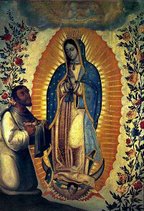
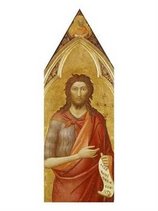


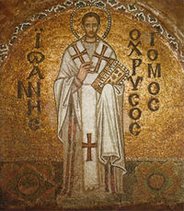
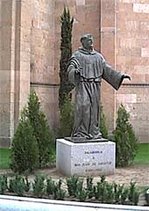


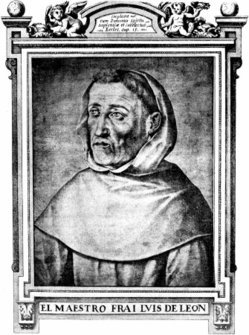




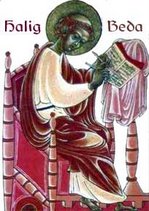






2 comments:
Are these your translations? Very well done.
Here is one of my attempts.
While he is not my favorite author he seems to have an affinity for me in translating into English. I also translated his mock epic La Gatomaquia.
Post a Comment